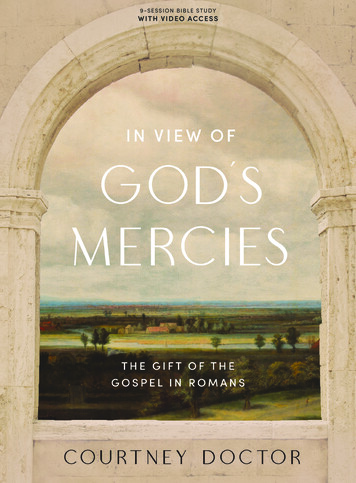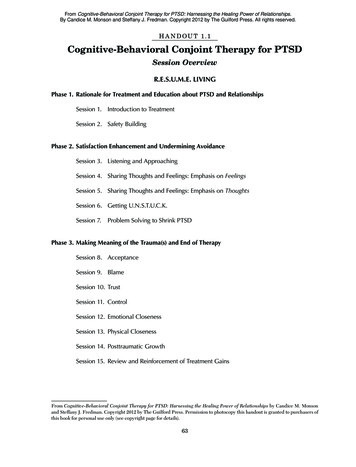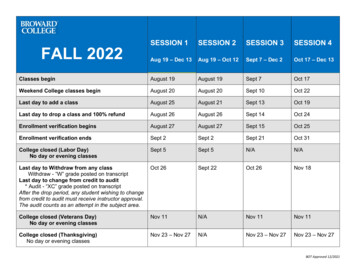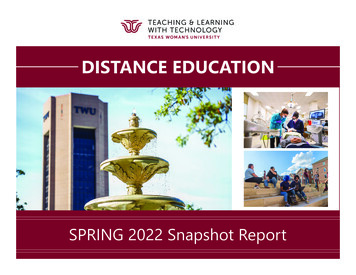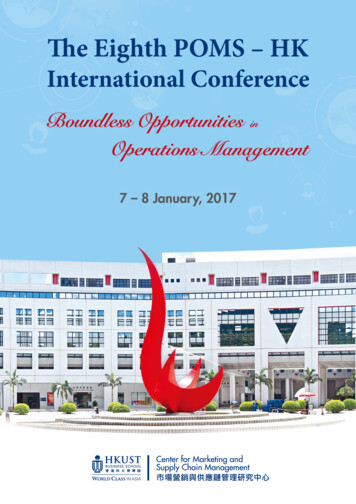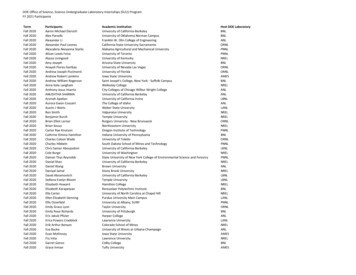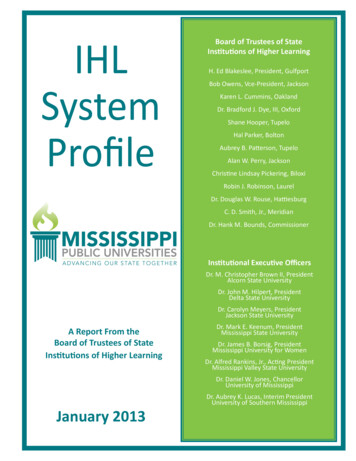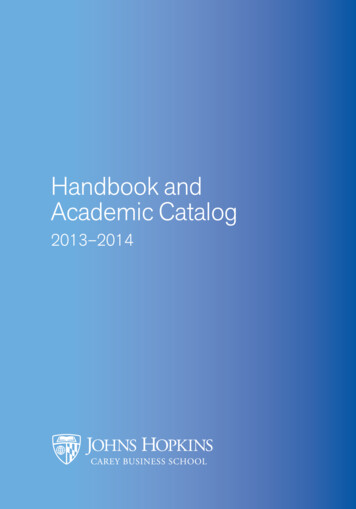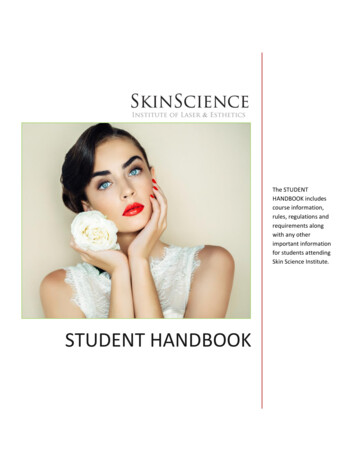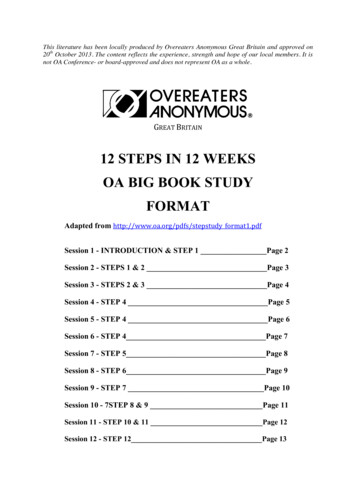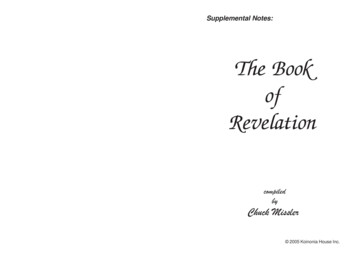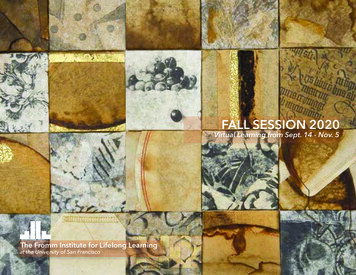
Transcription
FALL SESSION 2020Virtual Learning from Sept. 14 - Nov. 5The Fromm Institute for Lifelong Learningat the University of San Francisco
LOOK AT YOUR CHOICESFull descriptions and faculty biographies appear on pages 4 through 19. Instructions on “how to enroll’ are on the next page. Classes meet online via Zoomand run eight weeks from September 14 until November 5.MONDAY10 a.m. - 11:40 a.m.Prof. David Peritz Urgent Issues, Extraordinary Politics, 2020: National Elections at a Time of Intersecting Crises and Political PolarizationProf. Michael Zimmerman A Close, Intensive Study of James Joyce’s Ulysses1 p.m. - 2:40 p.m.Prof. Andrew Fraknoi The Violent Universe: Crashing Asteroids, Exploding Stars, and Hungry Black HolesProf. John Rothmann Making of the President 2020TUESDAY10 a.m. - 11:40 a.m.Prof. Richard Corriea Policing in America: An Examination of the History, Culture and Contemporary Issues in Policing and the Criminal Justice SystemProf. Cary Pepper The Films of Billy Wilder – Part 2: 1945–19661 p.m. - 2:40 p.m.Prof. Christopher O’Sullivan The Transformation of America: A Social and Economic History of the United StatesProf. Richie Unterberger The DoorsWEDNESDAY10 a.m. - 11:40 a.m.Prof. Toby Engelberg History of Architecture Part IIProf. Alan Goldberg Black (and Brown) Lit Matters: Voices in Contemporary African American and Hispanic (Latino) Literature1 p.m. - 2:40 p.m.Prof. Rodger Birt Cultural Capitol of Black America: Writers and Artists in Harlem, 1919-1939Prof. Larry Eilenberg Immigration to America on Stage & ScreenProf. Melissa Hudson Bell Dance Cultures and SubculturesTHURSDAY10 a.m. - 11:40 a.m.Prof. Kip Cranna I Hear American Singing: Adventures in American OperaProf. Bebo White The Manhattan Project – Personalities and Problems1 p.m. - 2:40 p.m.Prof. Jonathan Bailey Listening to Architecture: Sites and SoundsProf. Martin Carcieri Great Equal Protection CasesCOVER ARTWORK BY LUCIA MATZGER,READ HER STATEMENT ON PAGE 19.
IN THIS CATALOGIn this booklet you’ll find all of this session’s onlinecourses, their descriptions, and our faculty biographies,also general information about enrollment. Since 1976,the Fromm Institute has encouraged ‘career-free’persons, age 50 and older, from all walks of life, toengage their minds in academic pursuits. As you discoverwhat our lifelong learning program is all about, you areinvited to join them.MISSIONthe Fromm Institute, a “university within a university,”stages daytime courses for retired adults over 50years of age. Founded by Alfred and Hanna Fromm, theInstitute offers intellectual and social stimulation byintroducing its members to a wide range of college levellearning opportunities.vAlueSthe Institute has a firm commitment to learning,believing that older students should be able to learnwithin a peer setting and be taught by emeritusprofessors of their own age. As an independent, nonprofit program on the uSF campus, it appeals to itsmembers and to a broader philanthropic community forfinancial support.the Fromm Institute welcomes people regardless ofprevious academic achievement or their ability to pay amodest membership fee. this San Francisco “original”serves hundreds of older students each day, and includesthousands among its lifelong learning student bodyand alumni.HOW TO ENROLLenroll online at fromminstitute.org/sessions beginning Monday, August 10. Ifyou have any questions please call us at 415-422-6805 or email us(fromm@usfca.edu). the last chance to enroll this session is 3 p.m. Thursday,Sept. 17, 2020. once classes start, membership is closed to all applicants.FEESthe fees for participating in an online course is 85 per class. Scholarships areavailable for a maximum of four courses, but everyone must pay somethingtoward their membership. Your membership fee is not tuition and cannot beprorated or applied to a future session. Payment is collected online throughenrollment and may be done using a credit card or PayPal account.AdmINIStrAtIve StAFFCoNtACt uSDerek S. Leighnor, Esq.Executive DirectorThe Fromm Instituteoffice is closed due tothe outbreak of COVID19. The best ways toreach us are thefollowing:Scott MoulesAssistant Director, Technology & DesignCarla HallAssistant Director, Program ResourcesHerbert GraciaSpecialist, Instructional Technology & MediaPhone: 415-422-6805Email: fromm@usfca.eduDawa DorjeeProgram Manager, Student ServicesWeb: fromminstitute.orgAlfredo MartinezProgram & Fundraising AssistantMailing Address:2130 Fulton St. SF, CA94117-1080Professor Jonathan BaileyAcademic AdvisorPlease note mail is pickedup sporadically.3
FALL 2020 ONLINE COURSE DESCRIPTIONS WITH FACULTY BIOSFALL SESSION CLASSES WILL BE HELD ONLINE VIA ZOOM. RELIABLE INTERNET CONNECTIONS ARE REQUIRED.MONDAYS FROM 10:00AM – 11:40AMUrgent Issues, Extraordinary Politics, 2020: National Elections at a Time of Intersecting Crises and Political PolarizationProf. David PeritzAs we approach perhaps the most consequential presidential election in at least a generation, attention on the choice between candidates isoverwhelmed by a sense of national crisis rooted in the rapid global spread of a new coronavirus. But underlying the anxiety accompanying thismoment is a sense that this catastrophe reveals what many have suspected implicitly for some while: democratic societies appear increasinglyincapable of managing difficulties with deep structural roots in the forces unleashed by 21st century global society. Whether it is skyrocketingeconomic inequality, the disorienting transmission of false information via new media, massive waves of human migration, or accelerating globalclimate change and accelerating rates of deforestation and extinction, the issues we face appear to overwhelm the capacities of democraticpublics and the governments they elect. to make matters worse, unprecedented extreme partisan polarization makes it difficult for public opinionto coalesce around even the most urgent political issues. Partisan politics seems incapable of identifying either a shared understanding of commondifficulties we face or a range of viable policy options, basic prerequisites if the political process is to broker any kind of compromise solutions tothese problems. this course starts from this grim diagnosis but moves to a more optimistic prognosis: on a broad range of the most urgenteconomic, social, environmental, technological, health and human problem we face, there is no shortage of viable and promising policyapproaches that, if effectively implemented, would at least mitigate and perhaps solve what most of us agree are pressing difficulties besettingus and the world today. We will examine policy issues in the context of national political election, looking at the most important issues we face,the policy options available for addressing them, and the political fate of these proposals and candidates who embrace them. We will subjectthese policy options to the serious examination they deserve, modeling the kind of discourse that should be present in an important presidentialelection year.David Peritzdavid Peritz earned his BA from occidental College and Ph.d. from oxford. A Professor at Sarah lawrence since 2000, he is therecipient of a marshall Scholarship and taught at Harvard, deep Springs, dartmouth, uC Berkeley, and Cornell. His researchspecialization is modern and contemporary political philosophy, especially theories of democracy and justice and their relationto issues of diversity and inequality. He has taught at the Fromm Institute since 2016 and in lifelong learning for 20 years.4
FALL 2020 ONLINE COURSE DESCRIPTIONS WITH FACULTY BIOSMONDAYS FROM 10:00AM – 11:40AMA Close, Intensive Study of James Joyce’s UlyssesProf. Michael ZimmermanWe will first explore how Joyce makes us believe that leopold Bloom, a humble advertisement canvasser in dublin on June 16, 1904, issimultaneously Homer’s odysseus. Bloom is not a symbol of odysseus; he IS odysseus, just as a Catholic priest might tell us that the bread andwine in the Host aren’t a symbol of Christ; they Are his body and blood. We will then concentrate on molly Bloom who is literally (or almostliterally) faithful Penelope at the same time that she is waiting for her odysseus to return to their home in 7 eccles street. All the while, as thisuneducated woman from Galway speaks to herself while drifting off to sleep, she is making the most beautiful prose-poetry in the 20th century.molly is Woman herself, Joyce believed.Michael ZimmermanProfessor Zimmerman is Professor of english emeritus at San Francisco State university where he taught for forty years. Beforethat, he taught at Cal and Columbia (where he received his Ph.d.). He specialized in James Joyce, American literature, andliterature and Psychology. He is also a graduate of the San Francisco Center for Psychoanalysis (where he is on the faculty) andhe has a psychoanalytic practice in Berkeley. He has recently published a book on Joyce, tyrants of the Heart: A PsychoanalyticStudy of mothers and maternal Images in James Joyce.5
FALL 2020 ONLINE COURSE DESCRIPTIONS WITH FACULTY BIOSMONDAYS FROM 1:00PM – 2:40PMThe Violent Universe: Crashing Asteroids, Exploding Stars, and Hungry Black HolesProf. Andrew Fraknoiunlike the classic picture of a sky with peacefully twinkling stars, our modern view of the universe offers scenes of great violence -- violence thatcan turn planets unlivable, blow stars to smithereens, and even disturb entire galaxies. In this class, we will discuss what the latest discoveriesare telling us about cosmic dangers, and whether they will affect us on earth. We'll focus particularly on asteroids (rocky chunks) that come nearto earth, on how some stars die by exploding, and on "supermassive black holes" that can infest the centers of the great galaxies of stars.Illustrated with images from the world's top telescopes, and laced with some humor, the course will illuminate these ideas from astronomy inan accessible, enjoyable way. No science background is required.Andrew FraknoiAndrew Fraknoi retired as the Chair of the Astronomy department at Foothill College in 2017, having taught introductoryastronomy and physics at three different colleges and universities (including SF State). He was selected the California Professorof the Year in 2007 by the Carnegie endowment for Higher education and has won several national prizes for his teaching. Heis the lead author of a free, open-source, electronic textbook in astronomy, and has written books for teachers, children, andscience fiction fans. He appears regularly on local and national radio, explaining astronomical developments in everydaylanguage. the International Astronomical union has named Asteroid 4859 Asteroid Fraknoi in recognition of his contributions to the publicunderstanding of science.6
FALL 2020 ONLINE COURSE DESCRIPTIONS WITH FACULTY BIOSMONDAYS FROM 1:00PM – 2:40PMMaking of the President 2020Prof. John Rothmannthis class will offer a week by week perspective on the 2020 presidential election as it unfolds. the candidates’ dynamics, the issues as theyemerge through the course of the campaign and the choices to be made by voters will be analyzed each week. We will focus on particular statecampaigns as they unfold. Will the conventions matter? Will there be a vice presidential element to discuss? How will the as yet unforeseen eventsin the world impact the decision-making process? We will discuss all of this and more on the way to the historic making of the president 2020.John RothmanJohn F. rothmann is a politics/foreign policy consultant specializing on the uS, middle east and the uSSr. He is a frequentlecturer on American Politics and has been called “a scholar of modern republicanism” while being acknowledged “for hisunique insights, and in particular for rare and crucial materials.” He served as director of the Nixon Collection at Whittier College,as Chief of Staff to Sen. milton marks, and Field representative to Sen. Quentin Kopp, and was a founder of the raoul WallenbergJewish democratic Club. Widely published and honored, rothmann has spoken on more than 150 campuses and has been onthe faculty of uSF. Both his B.A. and his masters in Arts in teaching are from Whittier College. He is the coauthor of Icon of evil — Hitler’s muftiand the rise of radical Islam and Harold e. Stassen: the life and Perennial Candidacy of the Progressive republican. His article, “An IncomparablePope — John XXIII and the Jews,” appeared in Inside the Vatican in April 2014.7
FALL 2020 ONLINE COURSE DESCRIPTIONS WITH FACULTY BIOSTUESDAYS FROM 10:00AM – 11:40AMPolicing in America: An Examination of the History, Culture and Contemporary Issues in Policing and the Criminal Justice SystemProf. Richard Corrieathis course will provide students with a perspective on the development of modern policing, and current challenges facing agencies and thecommunities they serve. Course subject matter will include consideration of how concepts, including community values, restorative justice andsocial justice, drive police policy and policing methodologies. Significant attention will be given to the culture and policies of the San FranciscoPolice department. the curriculum includes a critical behind the curtain look at police culture, leadership and how departments operate. theinstructor will share his experiences and insights as the class considers the effectiveness of police and justice system policy related to topicsincluding police legitimacy, use of force, police discipline, body-worn cameras, criminal prosecutions, the opioid crisis and homelessness.Richard Corriearichard lyons Corriea is a former San Francisco Police Commander. He holds a Juris doctorate and a master’s in BusinessAdministration. He is a graduate of the California Command College for police executives. during his police career he had manyroles, including patrolling the streets of San Francisco, investigating violent crimes, legal advisor to the Chief of Police, headingup internal affairs, leading a crisis intervention team and station platoon lieutenant. As a senior executive, Corriea served asSupervising Captain of the entire city, Commanded the police academy and was commanding officer of richmond Police Station.upon promotion to Commander, Corriea had responsibility for the department’s metro division, which encompassed police services in five policedistricts. He has crowd-control and critical incident management experience. Corriea’s private sector experience includes the private practice oflaw, expert witness testimony and consulting in the aviation security industry. Corriea currently serves as long-term Care ombudsman. And heis director of the university of San Francisco’s International Institute of Criminal Justice leadership Advisory Board, and is adjunct professor inthe university’s School of management.8
FALL 2020 ONLINE COURSE DESCRIPTIONS WITH FACULTY BIOSTUESDAYS FROM 10:00AM – 11:40AMThe Films of Billy Wilder – Part 2: 1945–1966Prof. Cary PepperBilly Wilder has been called one of the most brilliant and versatile filmmakers of Hollywood’s Golden Age. Nominated for a total of 21 AcademyAwards, he won 6, and with “the Apartment” became only the second person to win Academy Awards as producer, director, and screenwriterfor the same film. His credits as a writer are no less impressive. He co-wrote the screenplays for “Ninotchka,” the seminal American film noir“double Indemnity,” “the lost Weekend,” “Sunset Boulevard,” “Stalag 17,” “Sabrina,” “Witness for the Prosecution,” “the Seven Year Itch,”“Some like It Hot,” “the Apartment,” and “Irma la douce,” among many other films. equally adept at writing and directing dramas andcomedies, Wilder took on subjects other filmmakers shied away from, creating a body of work that is timeless. In this follow-up course, we’lllook at six more Wilder classics: “the lost Weekend;” “Stalag 17;” “Witness for the Prosecution;” “one, two, three;” “Irma la douce;” and“the Fortune Cookie.”Cary PepperCary Pepper is a playwright, novelist, screenwriter, and nonfiction writer. His plays have been presented throughout the unitedStates and internationally. He’s a four-time contributor to the Best American Short Plays series from Applause Books, and he’spublished dozens of articles as well as other nonfiction.9
FALL 2020 ONLINE COURSE DESCRIPTIONS WITH FACULTY BIOSTUESDAYS FROM 1:00PM – 2:40PMThe Transformation of America: A Social and Economic History of the United StatesProf. Chris O’SullivanSPONSORED By THE ROgER BOAS CHAIR IN glOBAl HISTORy AND WORlD AFFAIRSAs the nation once again faces profound social and economic challenges, Professor o’Sullivan will lead us on a spirited journey through Americanhistory to explore how social change has driven economic transformation, and how economic change has influenced social progress. Startingwith the early republic and continuing to contemporary times, this course will explore controversies over slavery, economic development,abolitionism, civil rights, race relations, as well as examining American political leaders, the economic and social paths they pursued, and theconsequences of their actions. many of us may be familiar with the economic and social policies of major historical figures such as AlexanderHamilton, Abraham lincoln, or Franklin roosevelt, all of whom will be discussed, but what about the equally important, if lesser known,contributions of figures such as Henry Clay, Frederick douglass, Frances Perkins, and Walter reuther, among others?Chris O’SullivanChris o’Sullivan (BA u.C. Berkeley, Ph.d. london School of economics) has taught social and economic history courses in theuSF department of history for two decades. He is the author of five books on American history, is the recent recipient of uSF’sdistinguished teaching Award, and uSF’s Innovations in teaching Award, has served as a Fulbright visiting Professor at theuniversity of Jordan, and as a visiting research Fellow at the london School of economics.From left to right:Henry Clay, Frederick Douglass,Frances Perkins andWalter Reuther10
FALL 2020 ONLINE COURSE DESCRIPTIONS WITH FACULTY BIOSTUESDAYS FROM 1:00PM – 2:40PMThe DoorsProf. Richie UnterbergerSPONSORED By THE CARRIE & RONAlD lUDWIg CHAIR IN 20TH CENTURy ROCk & SOUl MUSICAn in-depth overview of the history of the doors, one of the most popular and influential rock groups of all time. using both common and rarerecordings and video clips, the course will trace their artistic evolution from the dawn of their career in the mid-1960s through singer Jimmorrison’s death in 1971. the development of their unique fusion of rock, blues, classical, jazz, and poetry into psychedelia will be explored indetail, as will charismatic singer morrison’s controversial life and image. Based in los Angeles, the doors were among the most important musicalacts to emerge from California, and the course will also examine their massive effect on the popular music and culture of their era.Richie Unterbergerrichie unterberger is the author of nearly a dozen music history books, including volumes on the Who and the velvetunderground, as well as a two-part history of 1960s folk rock. His book the unreleased Beatles: music and Film won a 2007Association for recorded Sound Collections Award for excellence in Historical recorded Sound research. He received his B.A.in english from the university of Pennsylvania, and has taught courses on the Beatles, the rolling Stones, 1960s folk-rock, thehistory of rock from 1955-1980, and San Francisco rock. He gives regular presentations on rock, soul, and folk history throughoutthe Bay Area incorporating rare vintage film clips and audio recordings, at public libraries and other venues. In 2014, he was one of seven recipientsof grants to conduct research at the rock and roll Hall of Fame as part of its Gladys Krieble delmas visiting Scholar Program.11
FALL 2020 ONLINE COURSE DESCRIPTIONS WITH FACULTY BIOSWEDNESDAYS FROM 10:00AM – 11:40AMHistory of Architecture Part IIProf. Toby Engelbergthe History of Architecture is presented from prehistoric structures to current architecture, and is given over five Fromm terms. the course isbased on the textbook World Architecture: A Cross Cultural History, by richard Ingersoll, (the textbook is optional). the text and course structureare based on three geographical areas considered for each time period. each 1.5 hour class includes approximately 75 images, and architectureis situated within historical, religious, geographic and cultural contexts. Part I (given in the Winter 2020 session) covered Prehistoric Structuresthrough Ancient rome. Part II continues with Chapter 5 in the text: the architecture of Ancient China, Ancient mexico, early Christian, Byzantine,Gupta India, Islamic, tang China, mayan, India and Southeast Asia, Islamic Spain and morocco, romanesque europe, and the mediterranean,(which begins Chapter 9). the course covers periods from 200 BCe to 1350 Ce.Toby Engelbergtoby engelberg is an architect who has practiced in San Francisco and New York, and is an Adjunct Professor in the dept. of Artat Contra Costa College. She received a Bachelor of Arts in Fine Arts from the State university of New York at Stony Brook, anda masters of Architecture from Yale university.WEDNESDAYS FROM 10:00AM – 11:40AMBlack (and Brown) lit Matters: Voices in Contemporary African American and Hispanic (latino) literatureProf. Alan goldbergthis course aspires to meet the challenge presented to us at this pivotal American moment. the outpouring of literature created by the currentgeneration of African American and Hispanic writers is artful, powerful, and provocative. At its best, literature deepens our appreciation of thehuman condition. It can dignify and universalize the internal and systemic marginalization of the other. With the backdrop of America comingto grips in this time of reckoning, an eclectic array of African American and latino writers are bearing witness. If we listen carefully, we can hearthese voices resonate as they force us out of our comfort zones and broaden our scope. When we survey the sweep of African American literature,we immediately recognize distinguished names such as James Baldwin, August Wilson, and maya Angelou. the late magnificent toni morrisonhas served as a guiding light for the current crop of prominent African American writers such as ta-Nehisi Coates, James mcBride, ColsonWhitehead, and Zadie Smith. Hispanic literature has also flourished as it comes into the mainstream. A generation ago, magical realism wasreimagined by a new wave of Hispanic American writers such as Isabel Allende, Sandra Cisneros, and Julia Alvarez. most have chronicled themulti-cultural immigrant struggle to assimilate while maintaining the integrity of their native cultures. In the 21st Century, the Hispanic diasporahas produced the likes of luis Alberto urrea, Junot diaz, and, of course, lin manuel miranda of Hamilton fame. In this course, I hope to featurea wide sampling of influential Black and Hispanic writers. Select short stories, novels, some drama and poetry—all supplemented by a stream ofvisual images and film clips—should be stimulating for all who cherish diversity in literature.Prof. Goldberg’s Bio Continues next page.12
FALL 2020 ONLINE COURSE DESCRIPTIONS WITH FACULTY BIOSWEDNESDAYS FROM 10:00AM – 11:40AMAlan goldbergWinding down a 35 year career at uSF, Alan Goldberg has concentrated on the multi-cultural variants of rhetoric in Americanliterature. He was educated at the univ. of Chicago, the univ. of Hawai’i, and SFSu. He was mentored by Nobel laureate SaulBellow at Chicago and Irving Halperin (late of the Fromm Institute) at SFSu. A scholar in Jewish American literature with specialemphasis on the works of Bellow, malamud, roth, and doctorow, he is presently exploring the current generation of prominentJewish American writers. He is championing the legacy of the late Philip roth in response to recent revisionist critiques. As alifelong devotee of baseball, he is also researching sports in American literature. He and his Nicaraguan-American wife, Indiana Quadra-Goldberg,a retired CCSF ethnic Studies professor with an emphasis on latina/o literature, share a deep appreciation of African American and HispanicAmerican literature.WEDNESDAYS FROM 1:00PM – 2:40PMCultural Capitol of Black America: Writers and Artists in Harlem, 1919-1939Prof. Rodger Birtthis course will be an examination of selected literary and visual artists who led the Harlem renaissance during the two decades between theend of World War I and the waning years of the Great depression.Rodger Birtrodger Birt received his Ph.d. in American Studies from Yale. He was a professor of Humanities and American Studies at SanFrancisco State university from 1980 until 2008. He is currently writing about photography and biography. He is a member ofthe thoreau Society.13
FALL 2020 ONLINE COURSE DESCRIPTIONS WITH FACULTY BIOSWEDNESDAYS FROM 1:00PM – 2:40PMImmigration to America on Stage & ScreenProf. larry EilenbergSPONSORED By THE ROBERT FORDHAM CHAIR IN lIBERAl ARTSFranklin delano roosevelt famously said to a gathering of the dAr (daughters of the American revolution): “remember, remember always thatall of us, and you and I especially, are descended from immigrants and revolutionists.” the immigrant story is the spine of the American narrativeand has been played out through all of American history in the nation’s theatres and cinemas. From dramas like Arthur miller’s “A view from theBridge” (Italian) and Amiri Baraka’s “Slave Ship” (African American) to musicals like “Fiddler on the roof” (eastern european Jewish) and “Flowerdrum Song” (Chinese), the American stage has told the many tales of coming to America. And in films as old as Charlie Chaplin’s “the Immigrant”or as recent as “Gangs of New York,” “the Namesake,” “maria Full of Grace,” and “the visitor,” the screen has done the same. this course willconsider and celebrate the quintessential American story of immigration through its stage and screen representations, with ample video clips asillustrations.larry Eilenberglarry eilenberg has had a distinguished theatrical career as artistic director, educational leader, and pioneering dramaturg. dr.eilenberg earned his B.A. at Cornell university and his Ph.d. at Yale university. Professor emeritus of theatre Arts at San FranciscoState university, he also taught at Yale, Cornell, the university of michigan, and the university of denver. Artistic director ofthe renowned magic theatre during the period 1992-2003, dr. eilenberg has served as a commentator for National Public Radio’s“morning edition,” as a u.S. theatrical representative to moscow, and as a popular lecturer on film and on comedy.14
FALL 2020 ONLINE COURSE DESCRIPTIONS WITH FACULTY BIOSWEDNESDAYS FROM 1:00PM – 2:40PMDance Cultures and SubculturesProf. Melissa Hudson Bellthis intergenerational course brings Fromm Institute students and uSF students together in an introduction to dance's culture-making functions.taking an embodied approach to learning about popular dance in American society, with a focus on current and historical moments in the SFBay Area, the course illuminates how dance practices inform and are informed by larger national and international values. the course includeshistorical/scholarly readings, guest lectures by dance professionals, videos, discussions, attendance at live events, and yes, dancing! Areas ofstudy may include ballroom, tango, lindyhop, ballet, street dance, club/drag performance, dance film, Broadway musicals, and dance on socialmedia. Fromm Institute students will meet once a week and are welcome (but not required) to join the uSF students who will meet twice a week(m/W 1pm-2:40pm). No prior dance experience required.Melissa Hudson Bellmelissa Hudson Bell is a dancer, choreographer and dance researcher based in Berkeley, CA. She has a Phd in Critical danceStudies and an mFA in experimental dance from uC riverside. Her research and choreographic interests circulate around 21stcentury strategies for audience engagement, especially those that incorporate food as a means of enlivening the senses, invokingmemory, or crafting community. She has recently shown choreography in the SF Bay Area, lA, Florida and New York. In addition,she has taught at uC Berkeley and Santa Clara university, acted as an mFA mentor for students at California Institute for IntegralStudies, performed with erika Chong Shuch Performance Project and tanya Bello's Project B, worked as an artist in residence at Santa Clarauniversity, and served as a member of the board of rAWdance. In addition to teaching at uSF, Bell currently serves as the vice President of WKBIndustries, an entertainment industry venture focused on racial justice and writes for the San Francisco Chronicle.15
FALL 2020 ONLINE COURSE DESCRIPTIONS WITH FACULTY BIOSTHURSDAYS FROM 10:00AM – 11:40AMI Hear American Singing: Adventures in American OperaProf. kip CrannaSPONSORED By THE VICTOR MARCUS CHAIR IN OPERA STUDIESAmerican opera? Some might be surprised to learn there even is such a thing. others are already big fans. American opera composers followedeuropean models at first, but by the early 20th Century they began striking out in many new directions, giving home-grown opera a distinctlynew character. their deliberate tunefulness and dramatic directness often earned critical ridicule for their supposed lack of european modernismand dissonant compositional daring. But the growing canon of distinguished American operas has now earned the loyal appreciation of devotedaudiences unphased by the scorn of academia or the snobbery of critics.using video illustrations, San Francisco opera’s dramaturg emeritus Kip Cranna will take us on a journey through the multifarious world ofAmerican opera, exploring the ground-breaking, distinctly American work of composers like John Philip Sousa, Scott Joplin, George Gershwin,and virgin thom
the faculty of uSF. Both his B.A. and his masters in Arts in teaching are from Whittier College. He is the coauthor of Icon of evil — Hitler's mufti and the rise of radical Islamand Harold e. Stassen: the life and Perennial Candidacy of the Progressive republican. His article, "An Incomparable Pope — John XXIII and the Jews," appeared .
